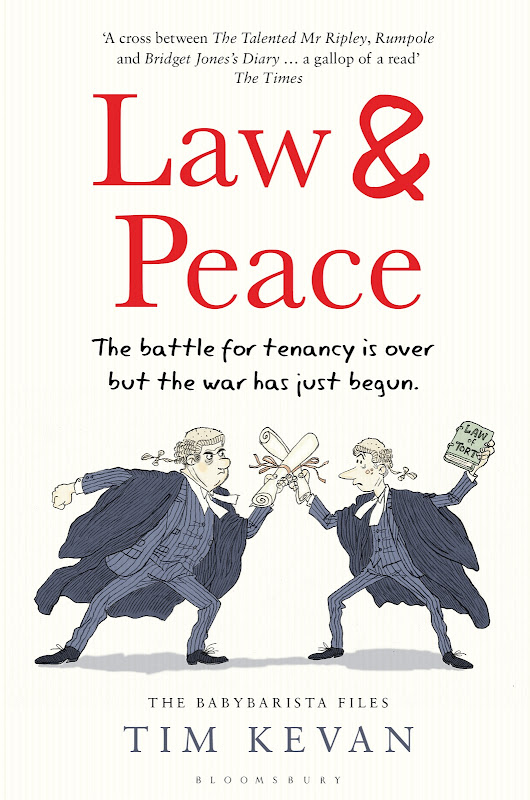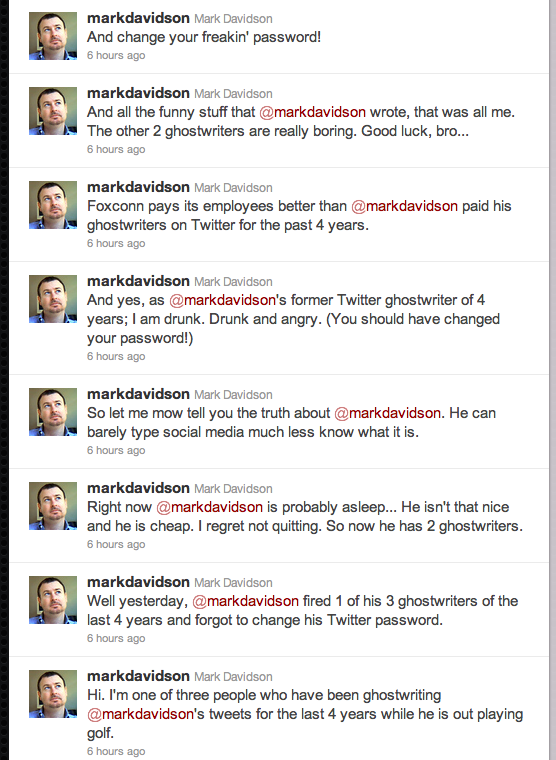As February neared, Ed. thoughtfully bumped me up to December, figuring that my experience and intellect were about as good as they were going to get by that point. I quickly demonstrated otherwise.
While the pixels on the previous week's Blawg Review were still warm, Ed. began sending me posts to read, prompting me for the theme of my Blawg Review, and encouraging me to get started composing it. I told him that I was having trouble deciding between two equally-awesome themes -- should my Blawg Review be about obscure holidays or holiday parades? Perhaps because he was unable to find a less hopeless host on such short notice, Ed. suggested that I instead consider a Dante-themed Blawg Review, in keeping with my blog's title.
I'm sure that wasn't the first time Ed. rescued a host from the perils of his own folly; I know that it wasn't the last.
As Blawg Review approached its first anniversary, it had already outlived most of the other blog carnivals which began around the same time. Most had petered-out after a few editions when pools of hosts and contributors dried-up, or descended into rank self-promotion as hosts elevated themselves above their blogging communities. Ed. didn't want either to happen to Blawg Review, so in addition to doggedly seeking new hosts and continuing to shepherd the posts each week, he asked a few people to join him as "Regular Contributors"; I agreed to become one of them. Thus we continued for nearly another year, until the survivors amongst us became "Sherpas".
Feeling a bit nostalgic at the moment, I'd like to return to those early days when I was a "Regular Contributor". We were tasked with finding and summarizing at least five links relevant to the host's theme, or which were otherwise worthy of Blawg Review treatment. Here goes, then, one last time:
- "Cathy Gellis Wins Pro Bono Victory Against U.K. Defamation Subpoena", "Part of Texas Online Solicitation of a Minor Statute Unconstitutional", "Sexting a Minor Isn’t a Crime in Texas", and "To Tell The Truth, 1st Amendment Edition":
Several posts this week celebrated the achievements of practitioner-bloggers -- those who don't just talk, they do. Ken White commended Cathy Gellis, who, on a pro bono basis, successfully quashed a subpoena by which a libel tourist, Gobat, sought to unmask an anonymous critic. White wrote:Mr. Gobat's lawyers' response was a model of blustering entitled outrage, demanding sanctions against Cathy and excoriating her. How dare she!
As a fellow Bay Area resident, I'm very glad that she's helping to keep our fair shores hostile to this particular form of tourism.
She dared, and she won. After Cathy's reply, and a lengthy hearing at which the judge (to quote Cathy) "took the better part of the hour expounding on all the due process problems requiring him to quash the subpoena," the judge quashed the subpoena. Far from granting Mr. Gobat's attorneys' demand for sanctions, the judge granted fees and costs to Cathy.
Mark Bennett did what many other Texas defense attorneys didn't think to do for their clients charged under the "dirty talking" portion of their state "online solicitation of a minor" statute -- he challenged the constitutionality of the provision and won:The unconstitutionality of the statute is a no-brainer. In fact, in light of Edwards the Court of Criminal Appeals (and I, in my briefs) arguably gave the State too much leeway by applying strict scrutiny rather than a purely categorical test.
Amongst many other bloggers and journalists, Venkat Balasubramani noted Bennett's advocacy and lauded the court's decision:This is a very careful and thorough opinion that should go on the reading list of any state legislator or staffer working on this type of legislation. It’s a good illustration of the proposition that if other statutes already cover the problem you are seeking to target, you may not have an easy time justifying a new overlapping statute against a First Amendment attack. Also, post-Alvarez, if content does not fit within a category of traditionally unprotected speech, legislators face challenges regulating it. Particularly when there are criminal penalties involved, courts will rightly scrutinize the statute carefully. Statutes directed at many online torts of recent vintage are probably susceptible to this type of a challenge, in particular those directed at online harassment and revenge porn.
The First Amendment has been at the heart of an ongoing debate between a law professor, Mary Anne Franks, and her many critics in the legal blogosphere. Franks has been a leading advocate for "revenge porn" laws, which would criminalize a particular form of "bad" speech she finds especially distasteful. In her view, prohibiting such "bad" speech isn't repugnant to the First Amendment; a considerable number of well-known legal bloggers vehemently disagree. As Scott Greenfield notes, many of those critics -- including the aforementioned Mark Bennett and Ken White, Eugene Volokh, Marc Randazza, and Greenfield himself -- "are all lawyers who have actually practiced law, fought First Amendment cases, and won", unlike, it seems, Ms. Franks. Greenfield writes:
The ruling strikes a chord in that it permits sexualized communications between an adult and minor that are not obscene or solicitative, even if there is some intent to arouse on the part of the adult-sender. Perhaps the transmission of this type of information alone is harmful, but as this case shows, that justification will not necessarily fly with a court that is vigilant on First Amendment issues.When you read and consider arguments, and find yourself being swayed by the free use of words like “scholarship” to convince you that someone who puts professor before their name must know what they’re talking about, consider whether someone’s intellectual abilities and reasoning have been tested by the crucible of the legal system or whether they just write stuff to fill the empty pages of hundreds of unread law reviews.
To tell the truth, would you rather rely on the opinion of a lawyer who has actually fought and won First Amendment cases, or someone who has accomplished nothing and relies solely on the attributed credibility that comes with claiming to be a scholar while telling the lawyers who actually win cases that they are idiots compared to her brilliance? - "Relevant = Material + Probative", "Physical Reality and the Federal Rules of Evidence", and "Why The Truth Doesn’t Matter At Trial": Prompted by a post by Jamison Koehler on materiality and probative value under the Federal Rules of Evidence, Mark Draughn and Jeff Gamso discussed the seeming incongruities between "facts" as these are in the real world and the "facts" argued in courtrooms. Draughn proposed a more scientific approach:
The idea is that the jurors should examine the factual assertion in question — “John shot James” for example — and then construct its logical negation (called the “null hypothesis” in science) that John did not shoot James, and assume for the moment that it is true. Now, for all the evidence presented at trial, they should consider how likely it is that that evidence could exist if their null hypothesis “John did not shoot James” was true.
Gamso suggested that at the heart of the perceived disconnect may be the rules' terminology choices:
....
So perhaps it would be more scientifically accurate to say that evidence is probative only if its the probability of its existence would be higher or lower depending on the truth or falsehood of the fact in question.
I can’t help noticing that this bears a similarity to the theoretical definition of the information content of a message....
So maybe we could say that evidence is probative only to the extent that it is surprising or unexpected in the context of the facts in dispute. For example, if John lives next door to James, the eyewitness who saw him driving by James’s house is a lot less unexpected, and so has less probative value. And the music selection on John’s iPod is no more or less surprising regardless of whether John killed James, so it’s probably irrelevant.The trouble with “fact” is that it’s conclusory. That is, every fact is true. If a fact were false, it would not be a fact. Therefore, the existence (whether present, past, or future) of every fact is true....
Having prompted the kerfuffle, Koehler returned to add his thoughts:
What Rule 401 is actually addressing is whether one or another piece of evidence makes more or less likely that something which must be proved to the satisfaction of the “finder of fact” (that is, the believer in chief) will be proved to the believer’s satisfaction.
The rule as written would make far more sense if instead of “fact” it referenced the particular thing at issue.Whenever criminal charges are brought, there is always an objective and presumably knowable truth as to what really happened. If you had superpowers, you could turn back time and hover above the events as they took place and learn for yourself what really happened....
But that objective truth is rarely, if ever, introduced at trial. The finder-of-fact – be it a judge or a jury — learns what happened not through direct observation but through the imperfect testimony of equally imperfect human beings. Memories fade. Perceptions skew. Minds rationalize. People have agendas. And everything the fact-finder learns is shaped through manipulation by the lawyers, with each side attempting to push the finder-of-fact toward its version of the truth. There are degrees of truth, and variations of the truth.
The objective truth tends to yield to the more believable truth, and, because to the winner go the spoils, that believable truth then becomes the accepted truth when the verdict is delivered.... - "New conflict on RU-486 abortions" and "A split ruling on birth-control mandate": Though this week's Blawg Review is a celebration of Ed.'s contributions to the legal blogosphere, I'd like to digress for a moment to celebrate Lyle Denniston's contributions as well. I've done so on a few occasions and he very considerately -- and unnecessarily -- thanked me for my words of praise. The fact is that he's one of the few reporters, online or off, who both understands the workings of our highest court and can explain these to lawyers and laymen alike with remarkable clarity. To say that the man's a treasure to the online legal community understates both his value and his audience; he's simply indispensable, and not only to legal folks, but to anyone who wants to know what the Supreme Court's words really mean. In a pair of posts this week, Denniston discussed cases addressing different aspects of this nation's unending debate over abortion. One post concerned a ruling on a Texas law limiting the use of the RU-486 drug:
That ruling conflicts directly with a decision by the Oklahoma Supreme Court on Tuesday that it would be unconstitutional to bar doctors from using the simpler and less expensive method of medical abortions throughout the first nine weeks of pregnancy. The Oklahoma court ruling was filed with the Supreme Court Tuesday night, responding to questions that the Justices had raised last June in agreeing to hear a case on the constitutionality of a 2011 abortion-regulating law in Oklahoma.
In a second post, Denniston reported a DC Circuit decision which may add another case to the Court's increasingly-crowded docket of health care mandate challenges:Taking a split approach, the D.C. Circuit ruled on Friday that profit-making corporations cannot make a religious challenge to the new health care law’s mandate that workers get birth-control and related medical coverage; however, if the firm is owned by only a few individuals, they can challenge it to defend their own religious objections, and they may well win. The two major parts of the ruling split the three judges in differing ways.
The Supreme Court already has three cases awaiting its attention on the Affordable Care Act’s contraception coverage mandate — with differing outcomes in lower courts — and the somewhat unusual approach taken by the D.C. Circuit on Friday may simply add an additional impetus for the Court to take on the issue in the current Term. - "If They Violate Your Privacy in the Woods, Do You Make a Sound?": Drama is often represented by Greek masks of tragedy and comedy. While the proceedings of a Congressional hearing are often dramatic, it's sometimes hard to tell whether a particular one is more tragic or comedic. Kevin Underhill tends to focus his blogging on the comedic side of the law, but a recent exchange during hearings on the NSA's appallingly-extensive online domestic spying is tragic in many ways. Representative Mike Rodgers, Chair of the House Intelligence Committee and a leading NSA apologist, argued that "Somebody whose privacy was violated. You can't have your privacy violated if you don't know your privacy is violated." Professor Stephen Vladeck, on the panel being questioned by the Committee, couldn't just play along with his co-panelists and let the idiot have his say; he replied, "I disagree with that. If a tree falls in the forest, it makes a noise whether you're there to [hear] it or not." Underhill had this to say about Rodgers:
So the fact that no one has complained about their privacy being violated means that no one's privacy is being violated, and if they aren't complaining because they don't know it's being violated then they have nothing to complain about, do they?
Underhill felt it necessary to embed a C-SPAN excerpt of the exchange "to prove it actually happened", which suggests that this particular Congressional drama was neither comedy nor tragedy, but farce.
Again, this guy is in charge of an "intelligence committee."
Many years ago, Ed. wrote to me:
It's been fun working with all the interesting lawyers, law students and professors who blog. I feel like a concert conductor who's been given the best orchestra in the world to conduct. I just stand up there and wave my arms around, and it comes out pretty good -- considering I can't even read music.There is no Blawg Review without its conductor and though lawyers, law students, and professors will continue to blog and discuss the law online, Ed.'s passing marks the day our music died.
Now we've had our say and, in keeping with tradition, I'll conclude Blawg Review #325 with a link back to the Blawg Review site, where this all began.
Thank you, Ed., for everything.




